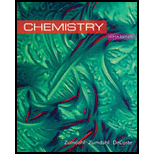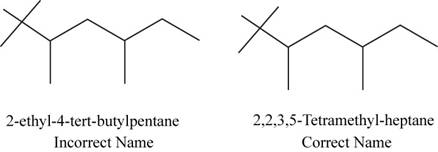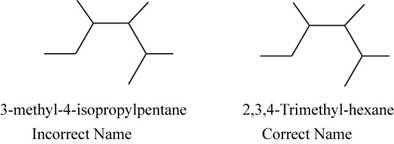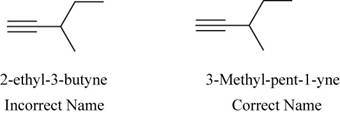
Concept explainers
(a)
Interpretation: The following incorrectly named compounds are to be drawn and named correctly.
Concept introduction: Organic compounds contain carbon and hydrogen atoms with their respective
To determine: The correct name of the given compound and its structure is to be drawn.
(a)
Answer to Problem 121AE
Answer
The correct name of the compound is
Explanation of Solution
Explanation
The correct name of the compound is
The structure of

Figure 1
The root name hexane signifies the presence of six carbon atoms.
(b)
Interpretation: The following incorrectly named compounds are to be drawn and named correctly.
Concept introduction: Organic compounds contain carbon and hydrogen atoms with their respective functional groups. When they are named the root term, suffix and prefix are to be remembered. They are named according to the International Union of Pure and Applied Chemistry
To determine: The correct name of the given compound and its structure is to be drawn.
(b)
Answer to Problem 121AE
Answer
The correct name of the compound is
Explanation of Solution
Explanation
The correct name of the compound is
The structure of

Figure 2
The root name is pentane which signifies the presence of five carbon atoms in a chain,
(c)
Interpretation: The following incorrectly named compounds are to be drawn and named correctly.
Concept introduction: Organic compounds contain carbon and hydrogen atoms with their respective functional groups. When they are named the root term, suffix and prefix are to be remembered. They are named according to the International Union of Pure and Applied Chemistry
To determine: The correct name of the given compound and its structure is to be drawn.
(c)
Answer to Problem 121AE
Answer
The correct name of the compound is
Explanation of Solution
Explanation
The correct name of the compound is
The structure of 3-methyl 4-isopropylpentane with its correct name is,

Figure 3
The root name pentane signifies the presence of five carbon atoms in a chain and
(d)
Interpretation: The following incorrectly named compounds are to be drawn and named correctly.
Concept introduction: Organic compounds contain carbon and hydrogen atoms with their respective functional groups. When they are named the root term, suffix and prefix are to be remembered. They are named according to the International Union of Pure and Applied Chemistry
To determine: The correct name of the given compound and its structure is to be drawn.
(d)
Answer to Problem 121AE
Answer
The correct name of the compound is
Explanation of Solution
Explanation
The correct name of the compound is
The structure of

Figure 4
The root name butyne signifies the presence of four carbon atoms with a triple bond in a chain and
Want to see more full solutions like this?
Chapter 22 Solutions
Bundle: Chemistry, Loose-leaf Version, 10th + Enhanced Webassign Printed Access Card For Chemistry, Multi-term Courses
- Using wedge-and-dash bonds, modify the bonds on the chiral carbon in the molecule below so the molecule has R stereochemical configuration. NH H Br X टेarrow_forwardProvide photos of models of the following molecules. (Include a key for identification of the atoms) 1,2-dichloropropane 2,3,3-trimethylhexane 2-bromo-3-methybutanearrow_forwardPlease draw the structure in the box that is consistent with all the spectral data and alphabetically label all of the equivalent protons in the structure (Ha, Hb, Hc....) in order to assign all the proton NMR peaks. The integrations are computer generated and approximate the number of equivalent protons. Molecular formula: C13H1802 14 13 12 11 10 11 (ppm) Structure with assigned H peaks 2.08 3.13arrow_forward
- A 0.10 M solution of acetic acid (CH3COOH, Ka = 1.8 x 10^-5) is titrated with a 0.0250 M solution of magnesium hydroxide (Mg(OH)2). If 10.0 mL of the acid solution is titrated with 10.0 mL of the base solution, what is the pH of the resulting solution?arrow_forwardFirefly luciferin exhibits three rings. Identify which of the rings are aromatic. Identify which lone pairs are involved in establishing aromaticity. The lone pairs are labeled A-D below.arrow_forwardA 0.10 M solution of acetic acid (CH3COOH, Ka = 1.8 x 10^-5) is titrated with a 0.0250 M solution of magnesium hydroxide (Mg(OH)2). If 10.0 mL of the acid solution is titrated with 10.0 mL of the base solution, what is the pH of the resulting solution?arrow_forward
- Given a complex reaction with rate equation v = k1[A] + k2[A]2, what is the overall reaction order?arrow_forwardPlease draw the structure in the box that is consistent with all the spectral data and alphabetically label all of the equivalent protons in the structure (Ha, Hb, Hc....) in order to assign all the proton NMR peaks. The integrations are computer generated and approximate the number of equivalent protons. Molecular formula: C13H1802 14 13 12 11 10 11 (ppm) Structure with assigned H peaks 2.08 3.13arrow_forwardCHEMICAL KINETICS. One of the approximation methods for solving the rate equation is the steady-state approximation method. Explain what it consists of.arrow_forward
- CHEMICAL KINETICS. One of the approximation methods for solving the rate equation is the limiting or determining step approximation method. Explain what it consists of.arrow_forwardCHEMICAL KINETICS. Indicate the approximation methods for solving the rate equation.arrow_forwardTRANSMITTANCE เบบ Please identify the one structure below that is consistent with the 'H NMR and IR spectra shown and draw its complete structure in the box below with the protons alphabetically labeled as shown in the NMR spectrum and label the IR bands, including sp³C-H and sp2C-H stretch, indicated by the arrows. D 4000 OH LOH H₂C CH3 OH H₂C OCH3 CH3 OH 3000 2000 1500 HAVENUMBERI-11 1000 LOCH3 Draw your structure below and label its equivalent protons according to the peak labeling that is used in the NMR spectrum in order to assign the peaks. Integrals indicate number of equivalent protons. Splitting patterns are: s=singlet, d=doublet, m-multiplet 8 3Hb s m 1Hd s 3Hf m 2Hcd 2Had 1He 鄙视 m 7 7 6 5 4 3 22 500 T 1 0arrow_forward
 World of Chemistry, 3rd editionChemistryISBN:9781133109655Author:Steven S. Zumdahl, Susan L. Zumdahl, Donald J. DeCostePublisher:Brooks / Cole / Cengage Learning
World of Chemistry, 3rd editionChemistryISBN:9781133109655Author:Steven S. Zumdahl, Susan L. Zumdahl, Donald J. DeCostePublisher:Brooks / Cole / Cengage Learning
 Chemistry for Today: General, Organic, and Bioche...ChemistryISBN:9781305960060Author:Spencer L. Seager, Michael R. Slabaugh, Maren S. HansenPublisher:Cengage Learning
Chemistry for Today: General, Organic, and Bioche...ChemistryISBN:9781305960060Author:Spencer L. Seager, Michael R. Slabaugh, Maren S. HansenPublisher:Cengage Learning Chemistry: An Atoms First ApproachChemistryISBN:9781305079243Author:Steven S. Zumdahl, Susan A. ZumdahlPublisher:Cengage Learning
Chemistry: An Atoms First ApproachChemistryISBN:9781305079243Author:Steven S. Zumdahl, Susan A. ZumdahlPublisher:Cengage Learning Introductory Chemistry: An Active Learning Approa...ChemistryISBN:9781305079250Author:Mark S. Cracolice, Ed PetersPublisher:Cengage Learning
Introductory Chemistry: An Active Learning Approa...ChemistryISBN:9781305079250Author:Mark S. Cracolice, Ed PetersPublisher:Cengage Learning World of ChemistryChemistryISBN:9780618562763Author:Steven S. ZumdahlPublisher:Houghton Mifflin College Div
World of ChemistryChemistryISBN:9780618562763Author:Steven S. ZumdahlPublisher:Houghton Mifflin College Div





